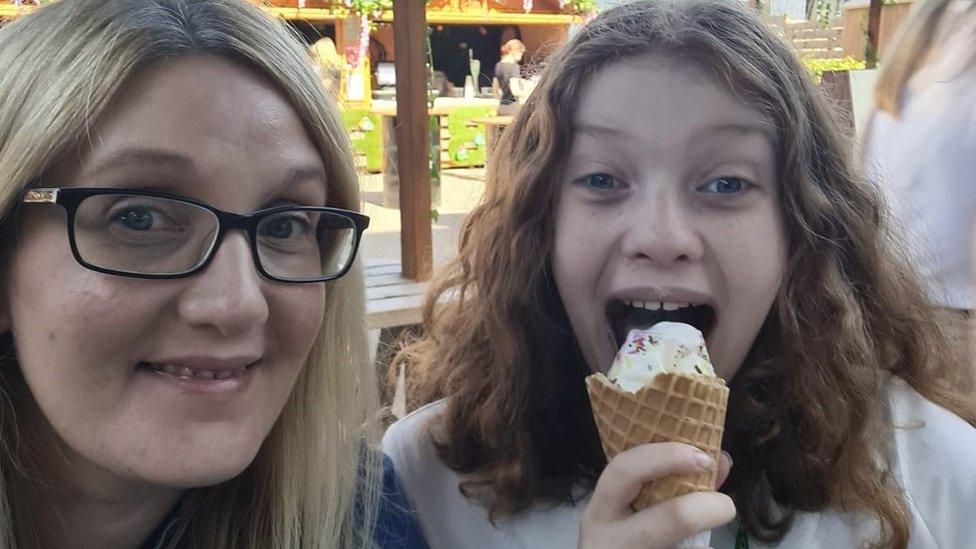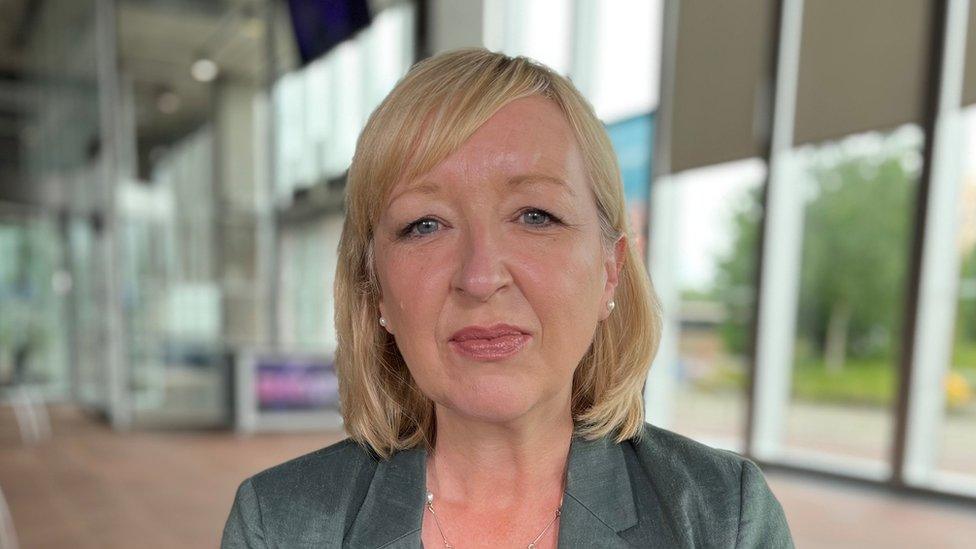My teen went five years without full-time education
- Published

Ellie has autism and ADHD, and Lisa says teachers struggled to cope with her behaviour
Ellie is one of thousands of children in Scotland who needs extra help when they are at school.
The 14-year-old has autism and ADHD, but her mother Lisa says her primary school teachers did not know how to cope with her behaviour.
It led to a series of exclusions, a part-time timetable and at one point she was getting just an hour of schooling a day.
For five years from primary five, when she was about nine, Ellie did not receive a full-time education.
Now the only place she can go to school is an hour-and-a-half from her home, and she has had to enrol as a weekly boarder.
It means that in term time Ellie can only spend time with her family at weekends.
"From primary five right up until third year we've literally had little, tiny, tiny bits of education and I wouldn't even say it's education, it's more welfare checks, how are you getting on?" Lisa said.
"All through Ellie's life it's been, we don't have the teaching staff, we don't have the staff, we don't have the staff."
The National Autistic Society Scotland says children who have autism and ADHD often face exclusions for behaviour perceived as naughty or disruptive.
But it can be caused by a lack of support or the school environment.
Many have sensory issues - where sounds can feel louder and classrooms hotter and more crowded - leading to them feeling overwhelmed.
Often children are taken out of class, sent home or even put on a part-time timetable, like Ellie.
A reduced timetable can work for some children but for many it is detrimental to their mental health.

Lisa said Ellie blamed herself for the problems.
"Mental health-wise [it was] really bad, with all the exclusions we actually got referred to child and adolescent mental health services," Lisa said.
"It was heart-breaking knowing, I don't want to cry, but knowing that you have a 12/13 year old who wants to kill herself, it's not a nice thing to know."
Ellie has what schools call "additional support needs" or ASN - a wide definition that includes any child or young person who needs a bit of extra help.
It could be a pupil with a disability, dyslexia, someone in the care system, or has mental health problems.
In 2022, more than a third (34.2%) of pupils in Scotland were identified as having additional support needs of some kind.
The National Autistic Society Scotland says children like Ellie are being forced to fail because there are not enough resources in the education system to help them.

Rob Holland wants the education committee at Holyrood to hold an inquiry
Its director Rob Holland says he has heard anecdotal evidence of an increasing number of informal exclusions, where a child could be sent home for the day or put on a part-time timetable.
But there is no way of knowing exactly how often this is happening because there are no statistics.
"We urgently need an inquiry to look closely at this issue and look at the levels of resource in the system, look at the levels of specialist teaching, look at the levels of training and awareness that teachers themselves have and look at the sensory environment that schools have," he said.
Official statistics on formal exclusions show that for ASN pupils there were 25.5 exclusions per 1,000 pupils in 2020/21. For children without additional needs, the rate was 5.3 per 1,000 pupils.
A recent survey of members of the Educational Institute of Scotland found that the struggle to respond to ASN needs was the most significant cause of stress in teachers' working lives.

Andrea Bradley of EIS says more resource is needed to help ASN children
Its general secretary Andrea Bradley blamed a chronic under-resourcing of ASN provision, large class sizes and excessive workload.
She said: "60% of our members say the single most important factor in reducing workload for them would be additional support needs provision to the scale that's really required now in classrooms in Scotland, given that 34% of children now have a recognised additional support need.
"Teachers increasingly feel low morale because they don't feel they are able to meet the needs of all of those children - neither are they meeting the needs of the children in the class who don't happen to have additional support needs."
A recent independent report on education for the Scottish government highlighted the problem, saying: "The need for timely attention to, and resourcing for, appropriate ASN provision is now urgent".
The Scottish government said it spent a record high £830m on additional support for learning in 2021/22.
"We have also invested an additional £60m since 2019-20 (£15m per year) and provide over £11m of funding to directly support pupils with complex additional support needs and services to children and families," a spokesperson added.
"The Scottish government is working to develop the support available to autistic learners. However, it is for local councils to determine the most appropriate educational provision, taking account of their legal responsibilities and the individual circumstances of the children and young people in their care.
"This guidance is clear that the wellbeing of a child must take priority and that exclusion should only be used as a last resort, where there is no appropriate alternative."
You can find information and support for issues raised in this story at BBC Action Line.